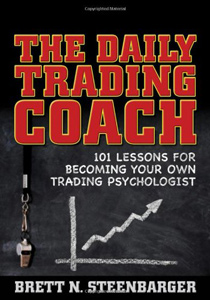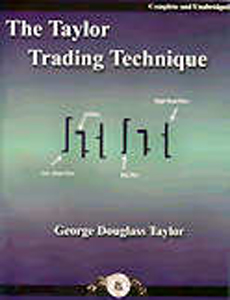Desperation Trading: Desperate Trading, Desperate Measures

Further Reading
I'm sure that we've all been desperate at some point in time. Sitting in front of your trading screen, with a series of losses, you'd be tempted to try and claw back some of your losses. Unless you've totally perfected trading like a robot and are totally and utterly emotionless, you would have felt this emotion at some point in your trading career.
It's late in the day; you're trading the Australian All Ordinaries index. You've had a string of losses. You look around your charts looking for setups which would fit your trading system. Your trading month is yielding a loss and you are looking for some trading opportunity which will allow you to earn back some (or all) of your losses back from the markets. Your wife is complaining of your loss making venture. (Sorry – I had to assume you were a married male – since statistically most traders are male) You have a bunch of mates to impress at the pub. You've got something to prove. There isn't much time left. You're desperate and your thinking has become biased. Of course you know what happens next. You take a open a bunch of questionable trades. These trades turn around. You watch as the prices fall against your entry price. Smash past your stop loss. Your stomach is in knots. You're screwed. Desperate trading.
Desperate Measures to Succeed at Forex Trading
I was browsing through some forums about forex trading when I stumbled upon a depressing post which really exhibited desperation in wanting to succeed at trading in any way possible. Here is the post:
I have failed in forex so much. When I first started forex two and half years ago, I really thought I could do well and suceed. But I have faild so much, I lost a lot of money, I'm depressed and my life has been so bad. I just realized I can't really trade myself and I want to start to use automaed trading systems. So, here I am planning to study programming like C, C++, and Java. I will withdraw all the money from my trading account and just study programming until I master it. Because I don't know nothing about programming now, it will take a couple of months. And then I will come back to forex. But I want to know if automated systems can really work if they are really well programmed. I read a post that says, every automated system has some odds and none of them can work. If it is true, I don't really have to waste my time on studying programming. I was planning to go back to university next year but now I'm cancelling it just to study programming. But if automated trading system can't really work even if they are very well programmed, then I don't have to waste so much time and energy on it. Please gimme some comments. Thanks
The forum contributor confesses that they have failed at forex trading for two and a half years. They thought they could succeed (like many over confident people) and have lost a lot of money. Many traders know what they are going through and have been in the same position in the past, but don't you think that after a certain point in time, the individual would think... what message is the market telling me? What am I doing wrong? Is trading even for me? Trading definitely isn't for everyone. Many treat it as a glorified casino.
There are many reasons why forex traders, share traders (stock traders) or traders of any type fail at trading. In this case we don't know why they are failing. All we know is that, whatever they were doing, they've failed at it for 2.5 years. And now, what do they want to do? They want to go even more advanced and hope that by learning programming and setting up some sort of automated trading would solve their problems. I'd probably suggest they stop deluding themselves that learning something else would help solve their problem. Automated trading is about having a working trading system – if your manual system isn't profiting, then by automating that system, it would just increase your losses further!
Desperation: a Negative Trading Emotion
Desperation was identified by Fan Yang of the FX Times as one of the negative trading emotions which include: Fear, Greed, Desperation and Euphoria/Pride. He says of the Desperation Trait:
Desperation – You win some you lose some. Many beginning and even seasoned traders fall in the trap of trying to make back what they lost. This is a desperation move to get back to the starting level, or maintain a certain profit-loss ratio. Without carefully planning positions sizing, changes in position out of desperation usually means adding a larger and larger position. What's worse is that sometimes, this works! But over time, the odds are your desperation moves will harm you more than cover your last few bad trades.
In dealing specifically with desperation in trading, Yang says:
Desperation is a common feeling a trader gets when things are going bad. After a few strings of losers, the trader feels compelled to gain it all back. The size of the hole in the trading capital becomes the focus of the trader. Another feeling that goes with desperation is hope.
- Instead of being confident that the strategy will eventually work out, the trader hopes that this next one will be good one because the strategy is not suppose to provide so many consecutive losers. This hope justifies the desperation move in increasing position size, or entering before the full signal is provided. When you are hoping, you are probably losing, so again make sure to stick to your position strategy.
- Make sure you don't justify any changes to your plan based on how much you lost in a roll, or what the break even amount is. If there are any changes to your positions, it should probably be scaling them down to keep the 2.5% exposure.
Interesting that Yang talks about a scaled down exposure down to 2.5% - which is awfully close to the conservative 2% rule recommended by traders to manage their risk.
Stop Desperate Trading
To avoid desperate trading:
- If you're serious about trading, you should have a trading plan, which at its bare minimum should state your exit strategy if things go sour.
- Take regular (scheduled if needed) from your trading desk
- Know your trading system. Have goals. If you are live testing a system, make sure you keep within the rules you've composed
- Trade with other people: possibly a mentor or a friend who can act as your sounding board
- Take a vacation if you want to reset yourself. A string of losses is devastating and emotionally draining for anyone.
- How to Trade Forex and Gold Options
- How to Trade the Gold Price and Profit!
- Forex Trading the EUR/USD Pair € EURO and $ US Dollar
- How to Trade Stock Market Indices S&P500
- How to Trade Crude Oil
- Forex Trading Psychology
- What Are Broker Recommendations?
- Free Tickets to Trading & Investing Seminar & Expo ($18) Brisbane 2013
- Stock Calc App
- All About Warrants
- Introduction to Exchange Traded Funds
- Introduction to Exchange Traded Funds: Features
- Introduction to Exchange Traded Funds: Domestic ETFs
- Introduction to Exchange Traded Funds: International ETFs
- Exchange Traded Commodities
- Australian Stock Scan
- Australian Online Share Trading
- List of Trading Books
- Interesting Thoughts about the Australian Dollar
- What's the Meaning of Hawkish?
- Do You Know How To Use the P/E Ratio
- Trading, Religion and Politics - Do They Have Anything in Common?
- Shares that are Volatile that Double and Half in the Short Term
- Telstra (TLS) T3
- Margin Call by E-mail
- The Cost of Holding a Position
- Lack of Disclosure: Compensation from ASX Listed Company
- Unrealistic Returns and Benchmarks
- CMC Markets Down
- Quality versus Quantity Forex Trading
- Woolworths 1H Sales $30.7bn up 3.2%
Date added 31-01-2013 - ASIC Fines CommBank's CommSec
Date added 25-09-2012 - Industry Super Network Calls to Ban High Frequency Trading (HFT)
Date added 22-09-2012 - NAB Launches Online Share Trading Platform
Date added 19-09-2012 - Reserve Bank of Australia Says 23 Countries Holding AUD
Date added 18-09-2012 - Australia Post Digital Mailbox
Date added 10-09-2012 - Winners and Losers of Trading for Week 2
Date added 16-01-2012 - 2012's First Week of the Best and Worst Traded Stocks
Date added 09-01-2012 - 2011's Last Best and Worst Traded Stocks
Date added 05-01-2012 - Best and Worst Pre-Christmas Traded Stocks
Date added 30-12-2011 - Trading Winners and Losers for Dec. 12-16
Date added 19-12-2011 - Best and Worst Traded Stocks for Dec. 5-9
Date added 13-12-2011 - Top 3 Best and Worst Traded Stocks
Date added 05-12-2011 - ASX Glitch Trading Halt
Date added 27-10-2011 - Worst Trade Stocks (and the Best)
Date added 06-08-2011
Top 150 Public Companies Listed on the Australian Stockmarket as at 29/05/2009
- BHP Billiton
- Westpac Banking Corporation (WBC)
- Commonwealth Bank of Australia (CBA)
- National Australia Bank (NAB)
- Telstra (TLS)
- ANZ
- News Corporation (NWS)
- Woolworths Limited(WOW)
- Woodside Petroleum Limited (WPL)
- Rio Tinto
- Westfield Group (WDC)
- Westfarmers Limited (WES)
- QBE Insurance
- CSL
- Newcrest Mining Limited (NCM)
- Origin Energy Limited (ORG)
- Santos Limited (STO)
- AMP Limited (AMP)
- Macquarie Group (MQG)
- Foster’s Group Limited (FGL)




